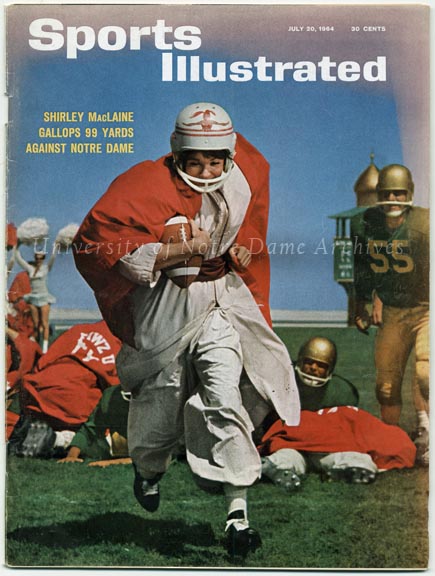
Earlier this week, actor Harry Morgan passed away. While he is probably best known for his role as Colonel Potter on M*A*S*H, Morgan also appeared in a campy movie with Notre Dame ties. John Goldfarb, Please Come Home! is a farce, inspired by the Francis Gary Powers incident, in which a United States spy crash-lands over enemy lines. In this movie, “Wrong-Way” Goldfarb, a former football player, ends up in the fictitious Middle Eastern country of Fawzia. Goldfarb and the U.S. Department of State are strong-armed into arranging a football game between Notre Dame and Fawz University to smooth over the incident. The King of Fawzia is no fan of Notre Dame, who cut his scrawny son from the football team. The CIA schemes for Notre Dame to throw the game in the name of international relations.

Actress Shirley MacLaine running with the ball in a football game against Notre Dame in the movie John Goldfarb, Please Come Home! To see the full article, visit the SI Vault.
Notre Dame officials balked at the idea of the movie, which portrayed Notre Dame football players “as undisciplined gluttons and drunks … dressed in the uniforms of the University, led by a violent and vulgar coach, befuddled by the previous evening’s revelry” [affidavit by Rev. Theodore M. Hesburgh as quoted throughout the clippings listed in the sources below].
In December 1964, Notre Dame brought forth a defamation lawsuit “to prevent the distribution of the novel and its movie version” [Scholastic, 12/11/1964, page 34]. Notre Dame argued that 20th Century Fox commercially used its name and symbols without consent and violated the privacy rights of Rev. Theodore M. Hesburgh, CSC, whose name was specifically used in the book. Fox claimed the First Amendment right to free speech. The lawsuit did delay the premiere, which was scheduled for Christmas 1964. The New York Court of Appeals sided with Fox, allowing them to distribute the film, which was released March 24, 1965. Fox won the lawsuit primarily because the film was clearly a lampoon and far from reality. The film was a critical failure and remains an obscure title today, which has become nearly as effective as a court ban.
Sources:
PATH 1-m-Gol
UDIS 16/31
UDIS 94/22
